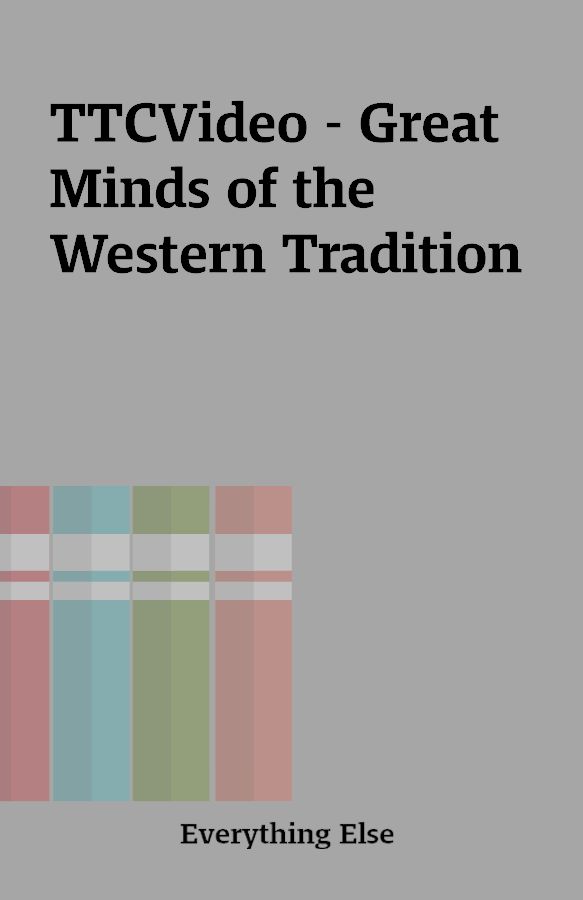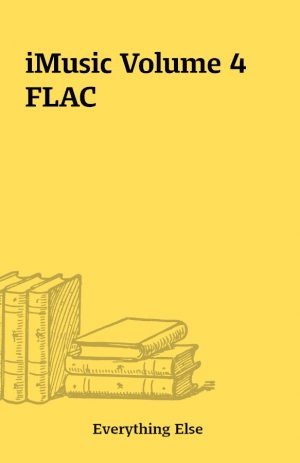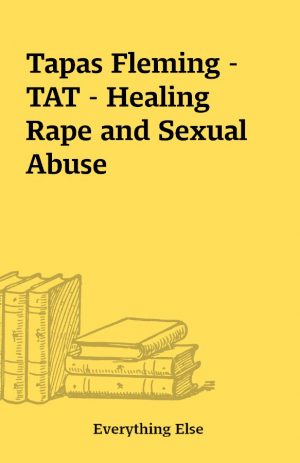TTCVideo – Great Minds of the Western Tradition
TTCVideo Great Minds of the Western Intellectual Tradition 3rd Ed – Dennis Dalton, Alan Kors, Robert Cane et al – DVD14 [course 470] L84
[14 DVDs – Xvid]
Description
For 3,000 years, mankind has grappled with life’s most fundamental questions. * What is real? * What should be the purpose of my life, and how should I lead it? * Who or what is God? * How can there be freedom in a world determined by causal laws? * When is it legitimate for one person to have power over others? * What is justice? Beauty?These are the crucial questions that thoughtful men and women have pondered since civilization began. The most brilliant minds in history focused on these questions—and their search for answers has left us an intellectual legacy of unsurpassed depth and richness.The Intellectual Adventure of a LifetimeGreat Minds of the Western Intellectual Tradition is a comprehensive survey of the history of Western philosophy from its origins in classical Greece to the present. The course is an 84-lecture, 12-professor tour of Western philosophical tradition and covers more than 60 of history’s greatest minds.This panoramic course is carefully designed and taught. Each lecture is given by a university scholar who is not only an expert in the topic but a gifted teacher, with classroom talents certified by teaching awards and top rankings from students.It took 3,000 years for the debate chronicled in these lectures to reach maturity. With this course, you can encompass it by the end of next month.Two Cities and the World They CreatedThe Western tradition is a blend of two outlooks that are characteristic of the ancient cities that generated them: Athens and Jerusalem.Western monotheism and its philosophical entailments—faith as an alternative to reason, mystic ecstasy, dogmatic scripturalism, and the assumed equality of all souls in the sight of God—ultimately derive from Jerusalem.Athens is the city of inquiry, hubris, and emancipation. The rationalism of Western culture, with its unprecedented control over nature, is a perennial element in Western philosophy, and it originates in Greece.Jerusalem supplies the mythos of the West and its holy text; Athens supplies the critical and self-critical spirit, which animates the Promethean and perhaps Faustian history of Western thought.In this course, you see the synthesis and tension between these two traditions over hundreds of years.Two Sets of Issues—Three Millennia of DebatePhilosophy in the West has centered on two basic sets of issues.One: What is the world and what can we truly know about it (metaphysics and epistemology)?Two: How should we live (ethics, social and political theory, and existentialism)?You learn how different thinkers address these issues in dramatically different ways. Yet you also see that this variation is not random; entire philosophical epochs can be defined by shared approaches to these basic questions, despite a plethora of different solutions.The course is in seven parts. Each part covers a specific period in the history of philosophy. Each of the seven parts begins with an introductory lecture to orient you to the period and the philosophers and ideas you study in that part.PART I: Classical Origins (Lectures 1 to 12)Part I introduces the entire series and the enduring problems of philosophy.These lectures acquaint you with the Greek Pre-Socratics (the world’s first scientific thinkers) and the Sophists (traveling teachers of rhetoric most widely seen through the works of their leading enemy).You then examine in detail the insights of three towering figures: Socrates, his student Plato, and Plato’s student, Aristotle. Much of the rest of philosophy and Western thought is a response to these three.You study the Stoics, Epicureans, and Skeptics of the late Hellenistic and Roman worlds, as well as the Greek commentator Polybius and the Roman statesman-philosopher Cicero.This first part of the series is truly foundational. It furnishes you with a solid ground on which you can build up and extend your own understanding of the developments that occur over millennia of philosophic debate. The aim of this course is to show these developments to you as passages in a narrative that records much disagreement but that contains substantial coherence beneath its contending voices.PART II: The Christian Age (Lectures 13 to 24)In the introductory lecture to Part II, you learn how we still stand on and are moved by the Greek and biblical traditions, often not something of which we are fully conscious.This meeting of Athens and Jerusalem is exemplified first by the influence of the neo-Platonist philosopher Plotinus on Saint Augustine. The symbiosis of Athens and Jerusalem continues during the High Middle Ages with Saint Thomas Aquinas’s synthesis of Aristotelian philosophy and Christian theology and then branches off into different directions represented by the mysticism of Meister Eckhart and the Protestantism of Martin Luther and John Calvin.PART III: From the Renaissance to the Age of Reason (Lectures 25 to 36)Part III marks the critical schism that developed between the claims of faith and those of science. You begin with the bold work of Machiavelli, who opened up new ways of thinking about moral and political life. This is contrasted to the work of statesman-saint Sir Thomas More and his Utopia.You examine the foundations of scientific thought in the work of Galileo, Sir Francis Bacon, and René Descartes.You return from science to political life, specifically the era of the English Civil War and its echoes in the absolutist political thought of Thomas Hobbes, who championed a coldly scientific view of human nature.You study the detached reverence toward being of Baruch Spinoza, the mathematician and philosopher Blaise Pascal, and the skepticism of the influential Pierre Bayle.The concluding lecture is a summation of the career and significance of Isaac Newton, whose pathbreaking Principia Mathematica gave the new science authoritative expression.PART IV: The Enlightenment and Its Critics (Lectures 37 to 48)Part IV covers the 17th and 18th centuries, capturing the sense of breathless discovery found in the Enlightenment, which reveled in the new freedom of human potential and scientific expansion. This was also when the new bourgeoisie found its voice in a demand for free markets, free speech, and more political power.This period marks the intellectual flowering that led to the American Revolution.This segment of the course, like the others, stresses the inevitable linkage between a thinker’s theory of knowledge and theory of morality: what we can know determines what we can know to be the right way to act. The lectures on John Locke and David Hume develop this point with special cogency. Others covered here include Vico, Mandeville, Bishop Berkeley, and Adam Smith.The Enlightenment stirred critics who feared its larger moral, spiritual, and political effects. Of these doubters, Jean-Jacques Rousseau was among the most influential, making him a fitting subject for the compelling lecture that concludes this segment.PART V: The Age of Ideology (Lectures 49 to 60)Part V continues to explore the meaning of the scientific revolution in our understanding of ourselves and the many problems that it raises.Is science the only source of true knowledge? If we have no control over our actions because causal laws determine them, then what is left of freedom? Choice? Right and wrong?You study philosophers asking how far the scientific method might be applied. Immanuel Kant responds to the challenges raised by the new scientific consciousness in the metaphysical and the moral arenas.You study Edmund Burke, the Anglo-Irish philosopher-statesman whose eloquent critiques of the French Revolution made him an architect of modern conservatism, as well as the giant of the liberal tradition, John Stuart Mill.Lectures follow on G. W. F. Hegel’s philosophy of history, and Karl Marx’s appropriation of a materialist version of Hegelianism as part of his effort to develop scientific laws of progress potent enough to overcome all human alienation.Because causal determinism undermines the possibility of freedom, choice, and virtue, this is a period of spiritual turmoil as well as of material advance.The final four lectures, on Søren Kierkegaard, Arthur Schopenhauer, and Friedrich Nietzsche, discuss three brilliant exponents of this period’s striving toward a new ground for the human self and its aspirations.PART VI: Modernism and the Age of Analysis (Lectures 61 to 72)Part VI introduces you to the philosophical struggles of our own day.Psychologists William James and Sigmund Freud still affect us. James’s philosophy of pragmatism seems characteristically American, yet bears a striking resemblance to many of Nietzsche’s ideas. Freud applied the tools of science to the philosopher’s sanctum sanctorum—the mind itself.Different 20th-century attempts to claim a new ground for the understanding of self and society are explored. You study the phenomenology of Edmund Husserl, the existentialism of Martin Heidegger, and the Frankfurt School’s efforts to use the ideas of Marx and Freud as a basis for rational moral and political engagement, the structuralism of the linguist Ferdinand de Saussure and the anthropologist Claude Lévi-Strauss.You conclude Part VI by studying Max Weber’s sociology, the ideas of A. J. Ayer, and the giant of the 20th century, Ludwig Wittgenstein.PART VII: The Crisis of Modernity (Lectures 73 to 84)Part VII covers the work of late 20th-century philosophers and theorists, beginning with Friedrich Hayek’s critique of the idea of central authority.You examine Karl Popper’s argument that scientific hypotheses must remain “falsifiable,” and the related but distinct imperative for whole societies to remain “open.”You then analyze Thomas Kuhn’s contribution in showing how scientific knowledge works in “the real world.”You see how the communication-based theories of Jurgen Habermas open up a new dimension in our understanding of the human world.You study Alvin Gouldner’s ironic class-based critique of Marxism.Postmodernism and the work of the French philosopher and literary theorist Jacques Derrida—a much-discussed ideology of our own day—is explored sympathetically yet critically.You conclude the series by studying the work of several widely influential American philosophers—Willard Quine, Richard Rorty, John Rawls, Alasdair MacIntyre, and Robert Nozick.Lectures:1. Introduction2. The Pre-Socratics—Physics and metaphysics3. The Sophists and Social Science4. Plato—metaphysics5. Plato—Politics6. Plato—Psychology7. Aristotle—metaphysics8. Aristotle—Politics9. Aristotle—Ethics10. Stoicism and Epicureanism11. Roman Eclecticism—Cicero and Polybius12. Roman Skepticism—Sextus Empiricus13. Introduction14. Job and the Problem of Suffering15. The Hebrew Bible and Covenantal History16. The Synoptic Gospels—The Historical Jesus and the Kingdom of God17. Paul—Justification by Faith18. Plotinus and Neo-Platonism19. Augustine—Grace and Free Will20. Aquinas and Christian Aristotelianism21. Universals in Medieval Thought22. Mysticism and Meister Eckhart23. Luther—Law and Gospel24. Calvin and Protestantism25. Introduction26. Machiavelli and the Origins of Political Science27. More’s Utopianism28. Erasmus Against Enthusiasm29. Galileo and the New Astronomy30. Bacon’s New Organon and the New Science31. Descartes—The Method of Modern Philosophy32. Hobbes—Politics and the State of Nature33. Spinoza—Rationalism and the Reverence for Being34. Pascal—Skepticism and Jansenism35. Bayle—Skepticism and Calvinism36. Newton and Enlightened Science37. Introduction38. Locke—Politics39. Locke—The Revolution in Knowledge40. Vico and the New Science of History41. Montesquieu and Political Thought42. The Worldly Philosophy of Bernard Mandeville43. Bishop Berkeley—Idealism and Critique of the Enlightenment44. Hume’s Epistemology45. Hume’s Theory of Morality46. Hume’s Natural Religion47. Adam Smith and the Origins of Political Economy48. Rousseau’s Dissent49. Introduction50. Kant’s “Copernican Revolution”51. Kant’s Moral Theory52. Burke—The Origins of Conservatism53. Hegel—History and Historicism54. Marx—Historical Materialism55. Marx—On Alienation56. Mill’s Utilitarianism57. Kierkegaard and the Leap of Faith58. Schopenhauer—The World as Will and Idea59. Nietzsche—Perspectivism and the Will to Power60. Nietzsche—The Death of God, Morality, and Self-Creation61. Introduction62. James’s Pragmatism63. Freud’s Psychology of Human Nature64. Freud’s Discontents65. A.J. Ayer and Logical Positivism66. Max Weber and Legitimate Authority67. Husserl and Phenomenology68. Dewey’s Critique of Traditional Philosophy69. Heidegger—Dasein and Existenz70. Wittgenstein and Language Analysis71. The Frankfurt School72. Structuralism—Saussure and Lévi-Strauss73. Introduction74. Hayek and the Critique of Central Planning75. Popper—The Open Society and the Philosophy of Science76. Kuhn’s Paradigm Paradigm77. Quine—Ontological Relativism78. Habermas—Critical Theory and Communicative Action79. Rawls’s Theory of Justice80. Derrida and Deconstruction81. Rorty’s Neo-Pragmatism82. Gouldner—Ideology and the “New” Class83. MacIntyre—The Rationality of Traditions84. Nozick’s Defense of LibertarianismIncludes guidebook. Enjoy!
You must be logged in to post a review.






Reviews
There are no reviews yet.